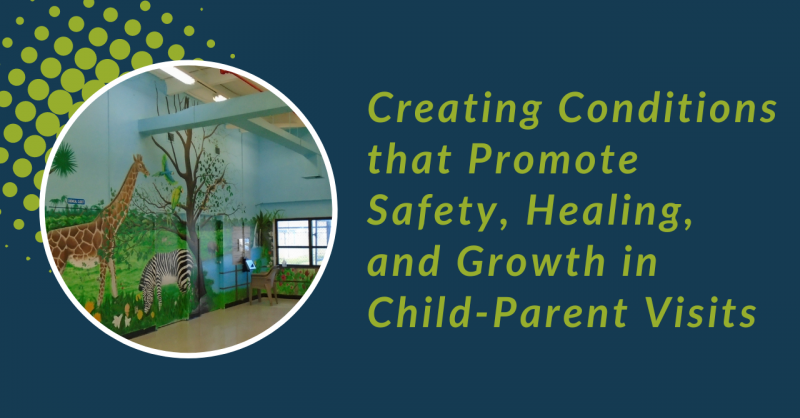Youth who receive special education services under the Individuals with Disabilities Education Act (IDEA 2004) and especially young adults of transition age, should be involved in planning for life after high school as early as possible and no later than age 16. Transition services should stem from the individual youth’s needs and strengths, ensuring that planning takes into account his or her interests, preferences, and desires for the future.
Strategies For Corrections Professionals
- Provide training and on-going supervision that includes:
- Accurate statistics about children and families of the incarcerated
- Strategies for respecting family relationships and circumstances
- Understanding self-awareness and bias
- Skills for building trust
- Strategies for helping children and their parents and caregivers communicate about difficult topics
- Design programs that train older children of incarcerated parents to be mentors for younger children of incarcerated parents
- Offer family counseling and guidance to youth and their incarcerated parents (this is especially important given the limited opportunity and time for calls and visits)
- Provide relevant and age appropriate guidance on the entire incarceration experience from arrest to reentry including:
- What families and the incarcerated parent can expect at each stage in the process
- Help finding job training
- Help finding stable housing
- Offer safe, comfortable ways for youth to share what is happening in their lives, understanding they may have fear about mandatory reporting rules
- Provide information and help for coping with the unpredictable nature of managing relationships with caregivers and following correctional policy as we attempt to connect and communicate with our incarcerated parent
- Corrections staff should receive training that emphasizes:
- That visits are supposed to be a positive experience for families
- That respectful treatment and interactions with the family and the incarcerated parent are what is expected by children of incarcerated parents
- When possible given safety and security considerations, courts should sentence and correctional agencies should place incarcerated parents at facilities close to their children and families, as closer proximity increases the chances for opportunities to visit and maintain family relationships
- Correctional policy should promote visitation practices that are child and family friendly and empower parent-child relationships by:
- Increasing time for visits
- Providing information to families ahead of time via documents or websites about rules for visiting
- Informing families when incarcerated parents are moved to another facility
- Adjusting clothing restrictions to be more reasonable and providing optional changes of clothing
- Correctional facilities should charge reasonable prices for phone calls and allow for longer calls to empower maintenance of parent-child bonds
- Correctional policies and practices should simplify and expedite approval forms when necessary (e.g., when the parent is transferred to a new facility or when names and numbers of potential visitors change)
- Correctional facilities and schools should collaborate to allow incarcerated parents to participate in school conferences via video or phone when appropriate
- Correctional facilities should collaborate with child welfare agencies to insure on going contact and visits for children in foster care
- Join with youth to create advocacy groups to increase public awareness and promote funding and expansion of services
Additionally, we have identified 11 strategies that apply across all professions:
- Get to know us: we are not statistics; we are youth who come from different backgrounds and family circumstances
- See us for who and what we are
- Know yourself: be aware of the assumptions and biases that you may have about us
- Let us know we can trust you. Be reliable and predictable. Listen without judgment
- Respect our right to confidentiality
- Help us to help each other by providing us with opportunities to gather together
- Help us channel our emotions into making a positive change through advocacy
- Honor our inner strength: don’t feel sorry for us
- Involve youth of incarcerated parents and their families in decisions about programs, policies and practices
- Agencies should understand the complexities of collaboration with and between other agencies (such as schools and corrections) because of confidentiality requirements
- Create lists of available resources and make them accessible
» Return to Youth Ideas for Change page.
» Return to the overview of the Listening Session Summary page.
» Return to Youth Perspectives page.
Research links early leadership with increased self-efficacy and suggests that leadership can help youth to develop decision making and interpersonal skills that support successes in the workforce and adulthood. In addition, young leaders tend to be more involved in their communities, and have lower dropout rates than their peers. Youth leaders also show considerable benefits for their communities, providing valuable insight into the needs and interests of young people
Statistics reflecting the number of youth suffering from mental health, substance abuse, and co-occurring disorders highlight the necessity for schools, families, support staff, and communities to work together to develop targeted, coordinated, and comprehensive transition plans for young people with a history of mental health needs and/or substance abuse.
Nearly 30,000 youth aged out of foster care in Fiscal Year 2009, which represents nine percent of the young people involved in the foster care system that year. This transition can be challenging for youth, especially youth who have grown up in the child welfare system.
Research has demonstrated that as many as one in five children/youth have a diagnosable mental health disorder. Read about how coordination between public service agencies can improve treatment for these youth.
Civic engagement has the potential to empower young adults, increase their self-determination, and give them the skills and self-confidence they need to enter the workforce. Read about one youth’s experience in AmeriCorps National Civilian Community Corps (NCCC).










